- Home
- Peter Swanson
All the Beautiful Lies
All the Beautiful Lies Read online
Dedication
For Nat Sobel
Epigraph
A treacherous smiler
With teeth white as milk,
A savage beguiler
In sheathings of silk,
The sea creeps to pillage,
She leaps on her prey;
A child of the village
Was murdered today.
—Elinor Wylie, “Sea Lullaby”
Contents
Cover
Title Page
Dedication
Epigraph
Part 1: Grey Lady Chapter 1
Chapter 2
Chapter 3
Chapter 4
Chapter 5
Chapter 6
Chapter 7
Chapter 8
Chapter 9
Chapter 10
Chapter 11
Chapter 12
Chapter 13
Chapter 14
Chapter 15
Chapter 16
Chapter 17
Chapter 18
Chapter 19
Chapter 20
Chapter 21
Part 2: Black Water Chapter 22
Chapter 23
Chapter 24
Chapter 25
Chapter 26
Chapter 27
Chapter 28
Chapter 29
Chapter 30
Chapter 31
Chapter 32
Chapter 33
Chapter 34
Chapter 35
About the Author
Also by Peter Swanson
Copyright
About the Publisher
Part 1
Grey Lady
Chapter 1
Now
Harry was briefly blinded—the bright May sun hitting just the right spot on his windshield—as he turned onto the crushed-shell driveway of the house in Kennewick Village. He pulled his Civic next to the orange Volvo station wagon—a car his father had loved—and covered his face with his hands and almost cried.
Alice, his father’s second wife, had called Harry early the previous morning to tell him that his father, Bill, was dead.
“What? How?” Harry asked. He was on his cell phone, walking across the tree-lined quad toward his dormitory. He’d been thinking about graduation, less than a week away, worrying about what he was going to do for the rest of his life.
“He slipped and fell.” Alice was speaking with gaps between the words. Harry realized she was crying, and trying not to show it, trying to sound calm and reasonable.
“Where?” Harry asked. His whole body was cold and his legs had turned to rubber. He stopped walking, and the girl behind him, also on her cell phone, grazed against his backpack as she moved around him on the brick walkway.
“Out on the cliff path, where he liked to walk.” Alice was now audibly crying, the words sounding like they were coming through a wet towel.
“Who found him?”
“They were tourists. I don’t know. They didn’t know him, Harry.”
It took a second phone call later that day to get all the details. Alice had gone out in the afternoon to do errands. She’d stopped by the store to see Bill, and he’d told her that he planned on going for a walk before it got dark and that he’d be home for dinner. She’d told him to be careful, as she always did, and that she was making shepherd’s pie for dinner, the way he liked it, with the cubed lamb instead of ground hamburger. The food was ready by six, the time they normally ate dinner, but there was no sign of Bill. And he wasn’t answering his phone. She called John, the only other employee at the bookstore, and he said that all he knew was what Alice knew. Bill had left a little before five to go for a walk. It was dark now, and Alice called the police station, where she was patched through to an Officer Wheatley. Just as he was explaining to Alice that there was nothing they could do if he’d only been missing a little over an hour, she heard another voice interrupt him in the background. The officer told Alice to hang on for a moment, and that was when she knew. When he came back on the line, his voice had altered, and he told her he’d be transferring her to a Detective Dixon. A body had just been found near Kennewick Harbor, and would Alice be available to make an identification.
“How did he die?” Harry asked.
“They won’t rule anything out, but they seemed to think he slipped and fell and hit his head.”
“He did that walk every day.”
“I know. I told them that. We’ll find out more, Harry.”
“I just don’t understand.” He felt as though he’d thought those words a hundred times that day. It was Thursday, and his graduation ceremony was scheduled for Sunday afternoon. His father and Alice had been planning on coming down to New Chester in Connecticut on Saturday night, staying through till Monday, and helping Harry pack up his things for his temporary return to Maine.
Instead, Harry packed everything himself, staying up half the night. Among his textbooks and notebooks, Harry found the paperback edition of Hillary Waugh’s Last Seen Wearing . . . that his father had given him at the beginning of the school year.
“It’s a crime novel set at a university,” his father had said. “I know you like Ed McBain, so I thought you might like this one, as well. It’s a very early procedural. If you find time to read it, of course.”
Harry hadn’t, but he opened the book now. Inside was a slip of paper in his father’s handwriting. One of his father’s favorite activities had been making lists, almost always related to books. This one read:
Five Best Campus Crime Novels
Gaudy Night by Dorothy Sayers
The Case of the Gilded Fly by Edmund Crispin
Last Seen Wearing . . . by Hillary Waugh
The Silent World of Nicholas Quinn by Colin Dexter
The Secret History by Donna Tartt
Harry stared at the note, trying to process what it meant that his father—the only person left in his life whom he truly loved—was gone. In the morning he wrote an e-mail to Jane Ogden, his thesis advisor, telling her he’d have to miss the history majors’ dinner that night, and explaining why. Then he went onto his college’s website and found an e-mail address for letting the school know that he wouldn’t be attending graduation. In bold letters on the website it said that cancellations could not be made within two weeks of graduation. But what were they going to do? If his name got called, and he wasn’t there, what did it possibly matter?
There was little else to do. His work and exams were all finished, all his requirements submitted. There were friends to see, of course. And there was Kim. He’d run into her the previous weekend at the St. Dun’s party. They’d kissed in the billiards room, and promised to see each other one more time before graduation. But he didn’t really want to see Kim now; he didn’t want to see anyone. His friends would hear the news, eventually, one way or another.
Harry rubbed his eyes with the palms of his hands, shut off the engine, and stepped out into the sea-salt air, much cooler than it had been in Connecticut. He spotted Alice in a second-floor window—his father’s and her bedroom window—and when she saw that Harry had noticed her she waved briefly. She was in a white robe, her skin and hair pale as gold, and she looked almost ghostly in the arched Victorian window. After waving she disappeared from view. He breathed deeply, preparing himself to see Alice, and preparing himself to walk into the house he’d only ever known as his father’s house, full of his father’s things.
In the doorway, Harry hugged Alice. Her hair smelled of expensive shampoo, something with lavender in it.
“Thank you for coming back early,” she said, her voice huskier than usual, strained from crying.
“Of course,” Harry said.
�
�I made up your old room for you. Can I help you bring things in?”
“No, no,” Harry said. “It’s not much.”
It took just three trips from the car to the second-floor bedroom. Harry’s old room had never really been his room; at least he had never thought of it that way. His mother had died of lung cancer when he was fifteen years old. Back then they’d lived in a two-bedroom apartment above his father’s first shop—Ackerson’s Rare Books—in the West Village in New York City. Because Harry had just begun high school when his mother died, his father had decided that it would be best for them both to stay in Manhattan until Harry had graduated. Living with his father in the dark, narrow apartment, made somehow smaller by his mother’s absence, was both terrible and comforting. As long as they continued to live there, they could feel Emily Ackerson’s presence, and the cold fact that she was gone forever.
In summertime, Harry and his father tended to spend more time in Sanford, Maine, than they did in New York. It was Bill’s hometown; his sister and her family, plus a cousin he was close to, still lived there. On those trips, Bill began to scout locations for a second rare-books store, one along the coast. They rented a cottage on Kennewick Beach so that Bill could spend more time looking at properties. That was how he’d met Alice Moss, who was working as an agent at Coast Home Realty. They became engaged during Harry’s senior year of high school, and when Harry went off to college, his father had made the permanent move to Maine, marrying Alice and buying the Victorian fixer-upper that he’d named Grey Lady. His business partner, Ron Krakowski, kept the New York store running, and Bill and Alice opened a second store in Kennewick Village, walking distance to the house.
The summer after freshman year was the only full summer that Harry spent in Maine with his father and his new wife. Alice, who had never married and was childless, had been ecstatic, transforming one of the guest bedrooms into what must have been her notion of a young man’s room. She’d painted the walls a dark maroon—“hunting-coat red,” she called it—and bought furniture from L.L.Bean that looked like it belonged in a fishing lodge. She’d even framed an original poster of The Great Escape, because Harry had once told her that it was his favorite film. He’d been grateful for the room, but slightly uncomfortable in it. His father, as he’d always done, traveled the country scouting books at estate sales and flea markets. Harry was left alone with Alice, who worked hard at being a replacement for his mother, constantly making him food, cleaning his room, meticulously folding his clothes. She was thirteen years younger than his father, which made her exactly thirteen years older than Harry, although she looked young for her age. Despite living on the coast of Maine her entire life, she avoided the sun because of her pale complexion, and her skin was unlined, almost lucid. Her only exercise was swimming, either at the community pool or in the ocean when it was warm enough. She ate ravenously, drank glasses of whole milk like she was a teenager, and was neither thin nor overweight, just curvaceous, with wide hips, and a narrow waist, and long legs that tapered to childlike ankles.
It had been hot and humid that summer, and there was no central air-conditioning in the house. Alice had spent all of July and August in cutoff jeans and a pale green bikini top, unaware of the effect she was having on her teenage stepson. She was a strange kind of beautiful, her eyes set too far apart, her skin so pale that you could always make out the blue veins right near the surface. She reminded Harry of one of those hot alien races from Star Trek, a beautiful female who just happened to have green skin, say, or ridges on her forehead. She was otherworldly. Harry found himself in a state of constant, confused sexual turmoil, guiltily obsessing over Alice. And the way she mothered him—making sure he had enough to eat, making sure that he was comfortable—made the attraction all the more distressing.
After that first and only summer in Kennewick, Harry had arranged to spend his college breaks either staying with friends or remaining in New Chester, doing research for one of his professors. He saw his father fairly often, because of how much time he still spent in New York, meeting with Ron Krakowski, negotiating purchases and sales. New Chester was less than two hours away from the city by train.
“You should come to Maine more often,” his father had told him recently. They’d been browsing through some of the recent arrivals at the Housing Works Bookstore in Soho. “Alice would like it.”
Bill rarely mentioned her name, as though doing so somehow tainted the memory of Harry’s deceased mother.
“I’ll come this summer,” Harry said. “How is she?”
“The same,” his father said. “Too young for me, probably.” He paused, then added: “She’s a loyal woman. I’ve been lucky, twice, you know.”
The room—Harry’s room—was nearly the same as it had been when Alice had first decorated it, three years earlier. The major difference being that the empty bookcase she’d originally provided—“You can leave some of your favorite books here, Harry”—had been filled with a number of his father’s first edition crime paperbacks, and the top of the bookcase had been covered with framed photographs, probably selected by Alice. Most were of Harry and his father, but one was a picture of his parents that he’d never seen before, back when they’d first met, sometime in the early 1980s, sitting together on a balcony, each with a cigarette perched between their fingers. They were roughly the age Harry was now, and yet they looked older somehow, more sophisticated. Harry felt like he’d just barely left adolescence and knew that he looked that way as well. He was tall and very thin, with dark, thick hair that flopped over his forehead. Kim had affectionately called him “beanpole.” At parties, random girls sometimes told him how much they envied his cheekbones and eyelashes.
“Harry.” It was Alice, just outside the door. She had whispered his name and he jumped a little at the sound. “Sorry. I didn’t know if you’d want tea or coffee so I brought both.” She stepped into the room, a mug in each hand. “They each have milk and sugar. That’s right, isn’t it?”
“Thank you, Alice. It is.” He took the coffee, not planning on drinking much, since what he really wanted to do was sleep. Being at the house had already exhausted him. “Is it okay if I take a nap? I didn’t sleep much last night.”
“Of course it is,” Alice said, backing away. “Sleep as long as you want.”
After shutting the door, he took a sip of the coffee, then removed his shoes and belt and slid under the plaid comforter, his mind filling with unwanted images of his father in his final moments. Had he died instantly without any knowledge of what was happening? Maybe he’d had a heart attack or a stroke, and that had caused him to fall?
Harry opened his eyes, giving up on the possibility of sleep. He could not bear to think of his father any longer and thought instead of college, the immersive reality of his last four years, and how it had suddenly ended. A surreal emotion came over him, the way you sometimes feel when you return from two weeks abroad, and the trip immediately seems like a mirage, as though it barely happened. That was how he felt now, thinking back on four years of college. Those years, his small group of friends, Kim Petersen, the professors he’d bonded with, were scattered now, permanently, like an ornate vase that shatters into a thousand pieces. His father was gone as well, leaving him with no family but Alice, and cousins he loved but with whom he had very little in common.
He stood by his bed, not knowing what to do next. Alice was vacuuming; he could hear the familiar hum from somewhere in the immense house.
His phone rang. Paul Roman, his best friend from college. He’d call him back; the last thing he wanted to do right now was talk. Instead, he walked to the window, cracked it slightly to let in some air. He looked out over the tops of the bright green trees. The steeple of the congregational church was visible, as was the shingled roof of the Village Inn and, in the distance, a snippet of the Atlantic Ocean, grey beneath a hazy sky. A young woman with dark hair held back in a headband walked slowly up the street. Harry watched as she noticeably slowed while passing the Vict
orian, glancing up at the windows. He instinctually stepped back into the bedroom. In the small, gossipy village of Kennewick, word must have gotten out.
His phone rang again. It was Gisela, another friend from college. Clearly, word had also gotten out among his friends at school. His father’s death had actually happened. He held the phone, knowing that he needed to call one of his friends back, but unable to get his fingers to move. The sounds of the vacuum were closer now. He sat down on the hardwood floor and leaned against the wall, rocking back and forth, still not crying.
Chapter 2
Then
Alice Moss was fourteen when she moved to Kennewick, Maine.
Her mother, Edith Moss, having finally received her check from the Saltonstall Mill settlement, took herself and her daughter from a one-bedroom apartment in downtown Biddeford to a single-family house in Kennewick Village. Her mother told Alice that now that they had money, and a house to call their own in a nice town, Alice would have to start acting like a little lady. Alice was just happy to be near the ocean. She claimed she had never seen it before even though Biddeford, less than twenty miles north of Kennewick, also bordered the shore.
“Of course you’ve seen the ocean,” her mother said. “I used to take you there all the time when you were a baby.”
“I don’t remember it.”
“Alice Moss, of course you do. You used to be afraid of the gulls.”
The mention of the gulls triggered a memory. Alice pictured her mother feeding them corn chips, laughing, as hordes of the dirty birds swarmed around them. She also remembered the prickly feel of her sunburned skin and the way the sand clumped to the side of her juice box. Still, to her mother she said: “I don’t remember any of that. That must have been some other baby you had.”
Her mother laughed, showing her crooked teeth, stained where they overlapped. “Well, now you can go to the beach all by yourself whenever you want. Show off that body of yours.” Edith darted out a hand toward her daughter’s breasts, probably thinking about twisting one of them, but Alice jumped back out of her reach.

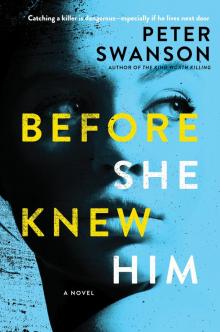 Before She Knew Him
Before She Knew Him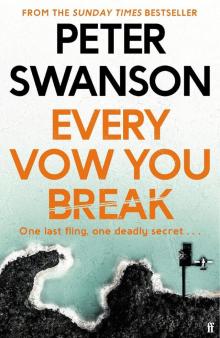 Every Vow You Break
Every Vow You Break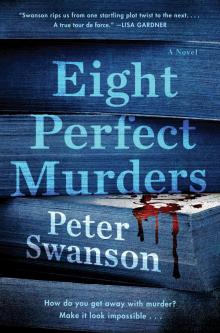 Eight Perfect Murders
Eight Perfect Murders Rules for Perfect Murders
Rules for Perfect Murders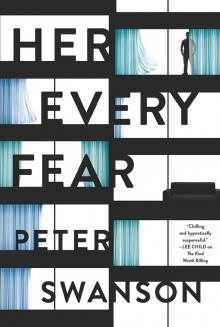 Her Every Fear
Her Every Fear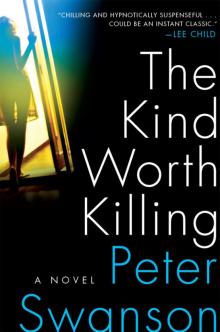 The Kind Worth Killing
The Kind Worth Killing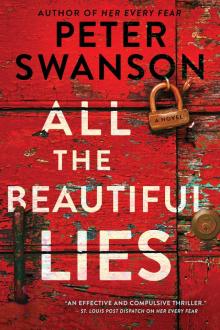 All the Beautiful Lies
All the Beautiful Lies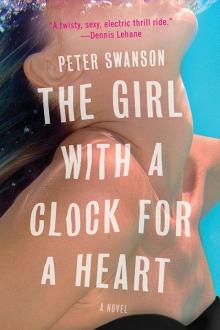 The Girl with a Clock for a Heart: A Novel
The Girl with a Clock for a Heart: A Novel